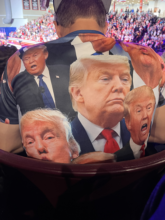With our journey through history following America’s false Promise of Equality and the Paradox of Trust in the American system of government complete, where does that leave us after the last presidential election? How do we define this moment history after a contest between an old white man and a younger woman of color in which the former won? Where are equality and trust to be found? The Trump and Harris campaigns ran on similar, existential themes. Both sides argued against an elite – billionaires or globalists – on behalf of the people. Both sides claimed to represent the ‘Real America’, one on behalf of their longing for a (mythical) America of the past, the other on behalf of a far more diverse and, dare I say, more realistic representation of the country. And both sides claimed that the other side is a threat to democracy.

Trump supporter at a 2024 campaign rally
Similar accusations of anti-democratic tendencies would be tossed around freely in early America. Alexander Hamilton and John Adams were accused of being monarchists as they argued for more central, federal governmental power, while Thomas Jefferson derided their ambitions as borderline tyranny. At the Trump rally in Indiana, Pennsylvania that I attended, I also saw a lot of references to ‘tyranny’, cloaked in the regalia of the American Revolution, or on t-shirts about the Second Amendment and the right to bear arms. As noted previously, James Madison feared the tyranny of the majority and tried to diffuse majoritarian power and to ensure the rights of the minority.
Threats to democracy
While these are timeless tensions, we should acknowledge that the temperature in the United States has been at a fever pitch the last five to eight years. The threats to democracy have arguably never been greater, especially since the storming of the U.S. Capitol on January 6th, 2021. Although polar opposites in character, the Black Lives Matter movement and the Make America Great Again movement represent two sides of the same coin in this moment in time. Compared to earlier periods when steps were made towards the fulfilment of the Promise of Equality, the progressive moment and the conservative response have this time sprung up almost simultaneously after the election of Barack Obama. It would have been highly symbolic for Jefferson’s Promise if a woman of color, part of the most vulnerable and oppressed demographic in America, would have become President of the United States. Her election would not have wiped the threats to democracy from public discourse straightaway. Nor would it have restored a level of trust into society on a moment’s notice. But it would have been a start.
(Dis)trust the process
 Democracy is only as good as those who use it. Democracy and the rule of law depend on the good faith of a substantial majority of the people. We have to learn to trust ourselves again with the levers of government. My book, Democracy of the Wild West, explores the structural and constitutional vulnerabilities in the American political system. But the real question is what elected politicians do with them. The level of trust that Trump voters have in the capacity of their chosen leader to enact change in America is almost unprecedented. But it’s a trust that includes the willingness to let Trump erode democratic norms when he sees fit. In other words, in a democratic process that is built on the confidence that a president will obey democratic rules, some voters are willing to set aside the very democratic process and rules that brought Trump to the White House. It is another paradox of trust but one that vindicates the mistrust of James Madison and the fears of George Washington and Alexander Hamilton that a demagogue who rides ‘the hobby horse of popularity’ and who joins ‘in the cry of liberty’, could ascend to the presidency.
Democracy is only as good as those who use it. Democracy and the rule of law depend on the good faith of a substantial majority of the people. We have to learn to trust ourselves again with the levers of government. My book, Democracy of the Wild West, explores the structural and constitutional vulnerabilities in the American political system. But the real question is what elected politicians do with them. The level of trust that Trump voters have in the capacity of their chosen leader to enact change in America is almost unprecedented. But it’s a trust that includes the willingness to let Trump erode democratic norms when he sees fit. In other words, in a democratic process that is built on the confidence that a president will obey democratic rules, some voters are willing to set aside the very democratic process and rules that brought Trump to the White House. It is another paradox of trust but one that vindicates the mistrust of James Madison and the fears of George Washington and Alexander Hamilton that a demagogue who rides ‘the hobby horse of popularity’ and who joins ‘in the cry of liberty’, could ascend to the presidency.
The end of the Great American experiment?
With Donald Trump’s convincing victory, fulfilling the Promise of Equality undoubtedly becomes harder. A new Trump administration will continue to implement and advance the conservative agenda of ‘colorblindness’ into law, as the erosion of voting rights and the erasure of affirmative action in college admissions illustrate. The two crucial principles from the often invoked book How Democracies Die that state that politicians should accept each other as legitimate rivals, and that whoever is at the helm of government should not use its powers to the fullest extent – will not easily be restored. America is at a stalemate that started in 2016 between progression and regression in American life. Perhaps a generational change in leadership is key to breaking that stalemate, but in what direction America will move is uncertain. Will The Promise of Equality be finally realized?
We need more people like Henry Clay, the Great Compromiser mentioned in part 2 of this blog series. In an America that is more getting more equal and diverse than ever, Americans must find their sense of belonging again and create a society in which no faction dominates. Just as James Madison would like it. Maybe then we can say that the Great American Experiment is over. In a good way.
Kenneth Manusama is an international lawyer and America expert. He completed his studies at VU Amsterdam and taught at New York University and Amsterdam University College. Kenneth is a regular guest speaker at various Dutch media outlets and programs, and an expert on the US Constitution and legal aspect of American politics. He is also the host of the podcast Amerikaanse Toestanden and the author of Democratie van het Wilde Westen.
is an international lawyer and America expert. He completed his studies at VU Amsterdam and taught at New York University and Amsterdam University College. Kenneth is a regular guest speaker at various Dutch media outlets and programs, and an expert on the US Constitution and legal aspect of American politics. He is also the host of the podcast Amerikaanse Toestanden and the author of Democratie van het Wilde Westen.



